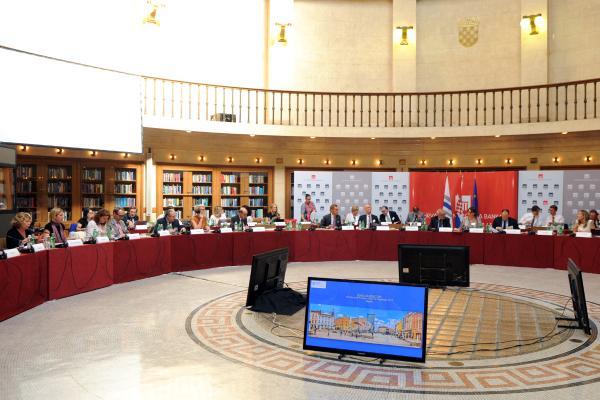
Meeting in the Croatian capital Zagreb, ahead of the Croatian Presidency of the European Union, the EIB Board of Directors’ this week agreed EUR 7 billion of new financing.
This included support for new investment to improve social housing, clean energy and sustainable transport, telecommunications, health and education, and more than EUR 2.8 billion for business investment through both direct financing and credit lines with local banks.
Supporting investment across Croatia
The first meeting of the EIB Board of Directors’ in the Croatian capital was welcomed by Prime Minister Andrej Plenkovic who highlighted that, “Cooperation with EIB has a long-reaching positive effect on Croatian economy, since it stimulates SME growth, export growth, development of new products and technologies as well as improvement of infrastructure. In that respect, cooperation of EIB and HBOR, as a most important local partner, significantly contributed to rising economic needs through a total of EUR 3 billion EIB lending to HBOR since 2001”.
During the visit to Croatia EIB President Werner Hoyer provided an overview of the EIB’s recent engagement in the country to Prime Minister Plenkovic and discussed the upcoming Croatian Presidency of the European Council.
President Hoyer confirmed that, “The EIB will continue to provide concrete, hands-on support to Croatia, working alongside our partners in the Croatian Government and within the business community, to strengthen sustainable growth and employment in the country. We are very proud of the way EIB serves Croatian citizens and their economy and the Bank is thankful to our local partners such as HBOR for their support in this process. I am very happy to see the high level of support EIB enjoys from the Croatian authorities in tackling the major challenges of today, including climate change – which is a top priority for the EIB”.
The two-day EIB board of directors meeting also approved EUR 150 million of new support for agriculture, tourism and manufacturing investment by companies across Croatia and since 2001 total EIB lending in Croatia has surpassed EUR 6 billion.
First discussions on ambitious new energy lending policy
The EIB Board of Directors also held their first discussions on the EIB’s new draft energy lending policy. The proposed new energy lending policy seeks to make the EIB’s energy lending consistent with Europe’s commitments under the Paris Climate Agreement and the EIB’s own ambition to strengthen its role as EU Climate Bank.
“Achieving the objectives of the Paris Agreement and addressing climate change requires a profound transformation of our economy and our society. We simply cannot shoulder the costs of inaction! Approving the future EIB energy lending policy will be a critical part of the EU’s response to addressing climate change and strengthening the EIB’s role as the EU Climate Bank.” said Werner Hoyer, President of the European Investment Bank.
The proposed policy includes detailed policy commitments to phase out support for energy projects reliant on fossil fuels.
“We will over the coming weeks provide extensive clarifications and assurances to ensure a fair and balanced package of supports for all Member States during the energy transition, and we will continue the discussion in October.” said Andrew McDowell, European Investment Bank Vice President with oversight responsibility for energy.
The draft policy, published in July, was produced following the most comprehensive public consultation ever held by the EIB, with intensive stakeholder engagement since the start of the year.
The public consultation solicited views and input from the public on how the EIB can best support EU energy policy and long-term climate and energy targets. More than 149 written contributions to the consultation process were received from organisations and individuals, alongside petitions signed by over 30,000 people.
Detailed deliberations of the new draft energy lending policy are expected to resume at the next Board of Directors meeting in Luxembourg on 15th October.
EIB approves EUR 7 billion for new social housing, clean energy, transport and business investment